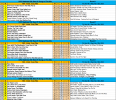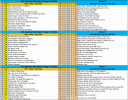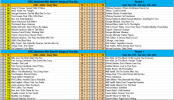Madison, the March 23 1985 Billboard Hot 100 says "Compiled from a national sample of retail store and one-stop sales reports and radio playlists." A one-stop is a distributor that buys records, cassettes and CDs wholesale from the record labels and resells them in smaller quantities to independent record stores. Beginning with the December 5 1998 Hot 100, "airplay-only" songs, which were not commercially available as singles, became eligible for the chart. Since August 11 2007, data from streaming services has also been included – which explains how Taylor Swift can have 90 songs on the Hot 100 in a single week. (Okay, maybe that is a slight exaggeration.)
Cash Box was published from 1942 to 1996. The "Best Selling Records" chart was initially a top 50. It became a top 60 with the April 13 1957 and a top 75 with the June 21 1958 chart. Beginning with the September 13 1958 chart, it was "Top 100 Singles." The Top 100 originally said "Best selling tunes on records, compiled from leading retail outlets." Beginning with the January 25 1964 chart – the Beatles' I Want To Hold Your Hand was in its first of what would be eight weeks at number one – the Top 100 said "Compiled from leading retail outlets – does not include airplay reports." Beginning with the September 23 1978 chart – A Taste Of Honey's Boogie Oogie Oogie was number one – the Top 100 was based on retail sales and radio airplay.
Many songs went to number one in Billboard but not Cash Box – or number one in Cash Box but not Billboard.
Cash Box was published from 1942 to 1996. The "Best Selling Records" chart was initially a top 50. It became a top 60 with the April 13 1957 and a top 75 with the June 21 1958 chart. Beginning with the September 13 1958 chart, it was "Top 100 Singles." The Top 100 originally said "Best selling tunes on records, compiled from leading retail outlets." Beginning with the January 25 1964 chart – the Beatles' I Want To Hold Your Hand was in its first of what would be eight weeks at number one – the Top 100 said "Compiled from leading retail outlets – does not include airplay reports." Beginning with the September 23 1978 chart – A Taste Of Honey's Boogie Oogie Oogie was number one – the Top 100 was based on retail sales and radio airplay.
Many songs went to number one in Billboard but not Cash Box – or number one in Cash Box but not Billboard.




